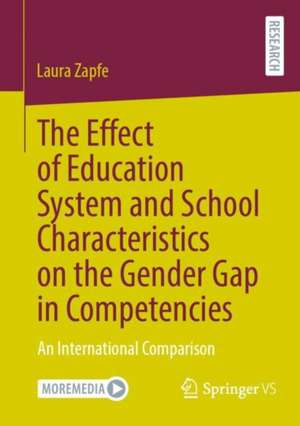The Effect of Education System and School Characteristics on the Gender Gap in Competencies: An International Comparison
Autor Laura Zapfeen Limba Engleză Paperback – dec 2023
Preț: 521.91 lei
Preț vechi: 614.02 lei
-15% Nou
Puncte Express: 783
Preț estimativ în valută:
99.88€ • 102.29$ • 83.08£
99.88€ • 102.29$ • 83.08£
Carte tipărită la comandă
Livrare economică 19 martie-02 aprilie
Preluare comenzi: 021 569.72.76
Specificații
ISBN-13: 9783658433222
ISBN-10: 3658433221
Pagini: 196
Ilustrații: XIX, 196 p. 15 illus. Textbook for German language market.
Dimensiuni: 148 x 210 mm
Greutate: 0.26 kg
Ediția:2023
Editura: Springer Fachmedien Wiesbaden
Colecția Springer VS
Locul publicării:Wiesbaden, Germany
ISBN-10: 3658433221
Pagini: 196
Ilustrații: XIX, 196 p. 15 illus. Textbook for German language market.
Dimensiuni: 148 x 210 mm
Greutate: 0.26 kg
Ediția:2023
Editura: Springer Fachmedien Wiesbaden
Colecția Springer VS
Locul publicării:Wiesbaden, Germany
Cuprins
Introduction.- Education contexts.- State of research.- Theoretical explanations for gender inequality: the macro-meso-micro model.- Data and analytical strategy.- Multilevel results.- Discussion.- Limitations and further research possibilities.- Conclusion.
Notă biografică
Laura Zapfe is a research assistant at the Chair of Quantitative Methods of Empirical Social Research at the Institute of Political Science and Sociology at the University of Würzburg. Her research interests include quantitative empirical research methods, empirical education research, and social inequality research.
Textul de pe ultima copertă
Laura Zapfe’s aim is to explain how education system and school characteristics affect the gender gap in mathematics and reading competencies. She adapts the macro-meso-micro model. At the micro level, she uses theories, e.g., gender-specific socialization, highlighting how gender-specific expectations and stereotypes cause gendered interest and skills and therefore gender differences in mathematics and reading. Deriving a macro-meso-micro link, she explains how education system characteristics such as competition, differentiation, and standardization, and school characteristics could increase or decrease the gender-specific socialization effects, leading to larger or smaller gender gaps in mathematics and reading competencies. On this basis, she performs a cross-national comparison of 78 countries participating in the Programme for International Student Assessment (PISA) 2018, combined with further researched macro data with three-level mixed-effects models. The results show that boys have an advantage in mathematics, girls have an advantage in reading, the gender effects are slightly higher for reading, and the gender effects at the school level are more pronounced than those at the country level.
About the Author
Laura Zapfe is a research assistant at the Chair of Quantitative Methods of Empirical Social Research at the Institute of Political Science and Sociology at the University of Würzburg. Her research interests include quantitative empirical research methods, empirical education research, and social inequality research.
